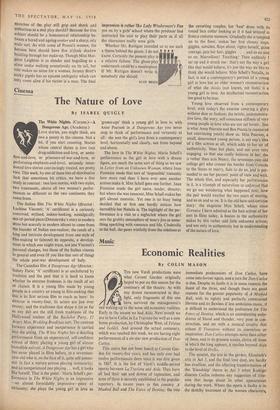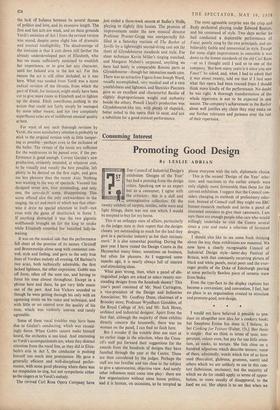Music
Economic Realities
MASON By COLIN TEN new Verdi productions were what Covent Garden originally hoped to put on this season for the centenary of the theatre. As with any dream reconstructed in day- light, only fragments of this one have survived the management's sad waking-up to the same old economic realities. Early in the season we had Aida. Next month we are to have Callas in La Traviata (as well as a new home production, by Christopher West, of Tristan and Isolde). And around the actual centenary, which was reached this week, we are having eight performances of a six-star new production of Don Carlos.
This opera has not been heard at Covent Gar- den for twenty-five years, and has only ever had twelve performances there since it was first given in 1867. It is the last of Verdi's middle-period operas between La Traviata and Aida. They have all had their ups and downs of reputation, and none of them is securely established in the popular repertory. In recent years in this country A Masked Ball and The Force of Destiny, the two immediate predecessors of Don Carlos, have come into favour again, and a turn for Don Carlos is due. Despite its faults it is in some respects the finest of the three, and though there are good reasons for the greater popularity of A Masked Ball, with its tightly and perfectly constructed libretto and its flawless if less ambitious music, it is difficult to understand the preference for The Force of Destiny, which is an uninteresting melo- drama of blood and thunder, very poor in con- struction, and set with a musical crudity -that echoes II Trovatore without its conviction or inspiration. Don Carlos attempts more than either of these, and in its greatest scenes, above all those in which the king appears, it reaches beyond Aida to the-level of Otello.
The quartet, the trio in the garden, Elizabeth's aria in Act 5, and the final love duet, are hardly less excellent, and the affecting transformation of the 'friendship' theme in Act 3 when Rodrigo disarms Carlos redeems any suggestion of trite- ness that hangs about its other appearances during the work. Where the opera is faulty is in the sketchy treatment of the women characters, the lack of balance between its several themes of politics and love, and its excessive length. The first and last acts are weak, and on these grounds Verdi's omission of Act 1 from the revised version was sound, despite some slight loss of dramatic and musical intelligibility. The disadvantage of the omission is that it cuts down still farther the already underdeveloped part of Elizabeth, who has no music sufficiently sustained to establish her importance, or to give her any character, until her belated aria in the last act. For this reason the act is still often included, as it was here. What was needed from Verdi was a more radical revision of the libretto, from which the part of Eboli, for instance, might easily have been cut to give more room to Elizabeth and to tighten up the drama. Eboli contributes .nothing to the action that could not fairly simply be managed by some other means, and her two completely superfluous arias are of indifferent musical quality at best.
For want of any such thorough revision by Verdi, the most satisfactory solution is probably to stick to the original version with as little tamper- ing as possible—perhaps even to the inclusion of the ballet. The virtues of the music are sufficient for the weaknesses to be passed over, if the per- formance is good enough. Covent Garden's new production, evidently intended, at whatever cost, to be visually and vocally the best possible, left plenty to be desired on the first night, and gave me less pleasure than the recent Aida. Nothing was wanting in the way of spectacle. Visconti has designed seven sets, four outstanding, and only one, the auto-do-fé scene, disappointing. This scene offered also the only awkwardness in the staging, the art and merit of which was that other- wise it drew no special attention to itself—not even with the game of shuttlecock in Scene 3. If anything distracted it was the two gigantic wolfhounds brought on for the king to stroke while Elizabeth consoled her banished lady-in- waiting.
It was on the musical -side that the performance fell short of the promise of its names. Christoff and Brouwenstijn alone sang with consistent con- trol, style and feeling, and gave us the only true lines of Verdian melody all evening. Of Barbieri's two arias, both technically admirable, the first Jacked lightness, the other expression. Gobbi was off form, often off the note too, and having to force his tone almost throughout. Except in a phrase here and there, he got very little music out of the part. And Jon Vickers sounded as though he were getting through his only with an agonising strain on his voice and technique, and with little or no control over the quality of his tone, which was violently uneven and rarely agreeable.
Some of these vocal troubles may have been due to Giulini's conducting, which was exceed- ingly fierce. When Gobbi cannot make himself heard, the orchestra is too loud. And interesting as Verdi's accompaniments are, when they distract attention from the vocal line, as they did in Eliza- beth's aria in Act 5, the conductor is pushing himself too much into prominence. He gave a generally efficient and well-disciplined perfor- mance, with some good phrasing where there was no temptation to slog, but not sympathetic either to the singers or to Verdi's melody.
The revived Carl Rosa Opera Company have just ended a three-week season at Sadler's Wells, playing to slightly thin houses. The promise of improvements under the new musical director Professor Procter-Gregg was unexpectedly ful- filled in a Saturday matinee of The Barber of Seville by a lightweight second-itring cast not far short of Glyndebourne standards and style. For sheer technique Kevin Miller's singing matched, and Margaret Nisbett's surpassed, anything we have had lately in comparable Rossini parts at Glyndebourne—though her intonation needs care. , There was an attractive Figaro from Joseph Ward, vocally accomplished, very musical and of a rare youthfulness and lightness, and Stanislav Pieczora gave us an excellent and characterful Basilio of slightly disproportionate weight and authority beside the others. Powell Lloyd's production was Glyndebourne-like too, with plenty of slapstick, better suited to this opera than to most, and not a substitute for a good musical performance. . The most agreeable surprise was the crisp and lively orchestral playing under Edward Renton, and his command of style. Two days earlier he had conducted a deplorable performance of Faust, poorly sung by the two principals, and un- believably feeble and nonsensical in style. Except for some slight improvement in ensemble it was down to the lowest standards of the old Carl Rosa —or so I thought until I said so to one of the company. 'But how many years is it since you saw Faust?' he asked, and, when I had to admit that it was about twenty, told me that if I had seen what this opera had been rescued from I should think more kindly of the performance. No doubt he was right. A thorough transformation of the whole repertoire is not to be expected in one season. The company's achievement in the Barber alone well justifies any claim they may make on our further tolerance and patience over the rest of their repertoire.



































 Previous page
Previous page